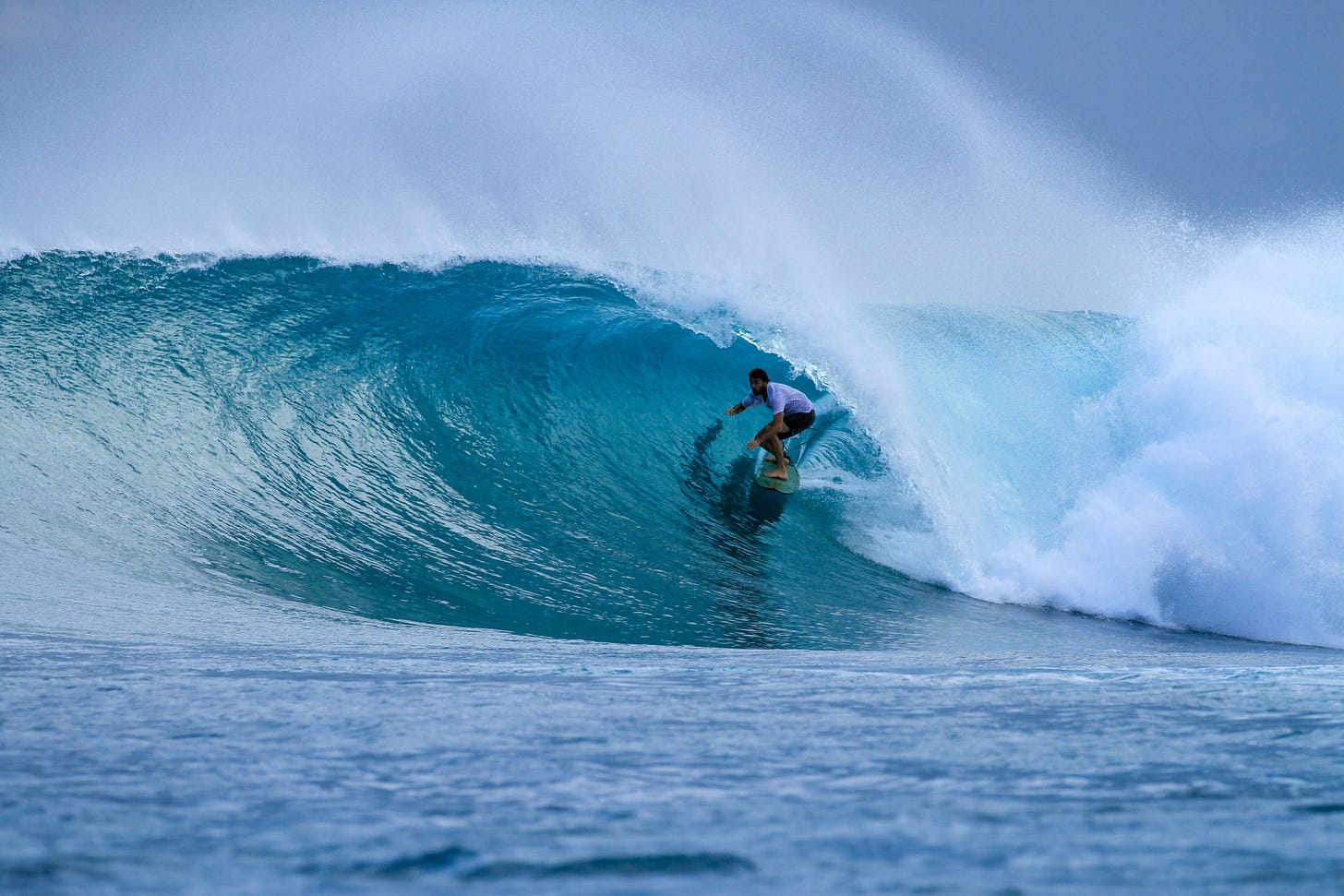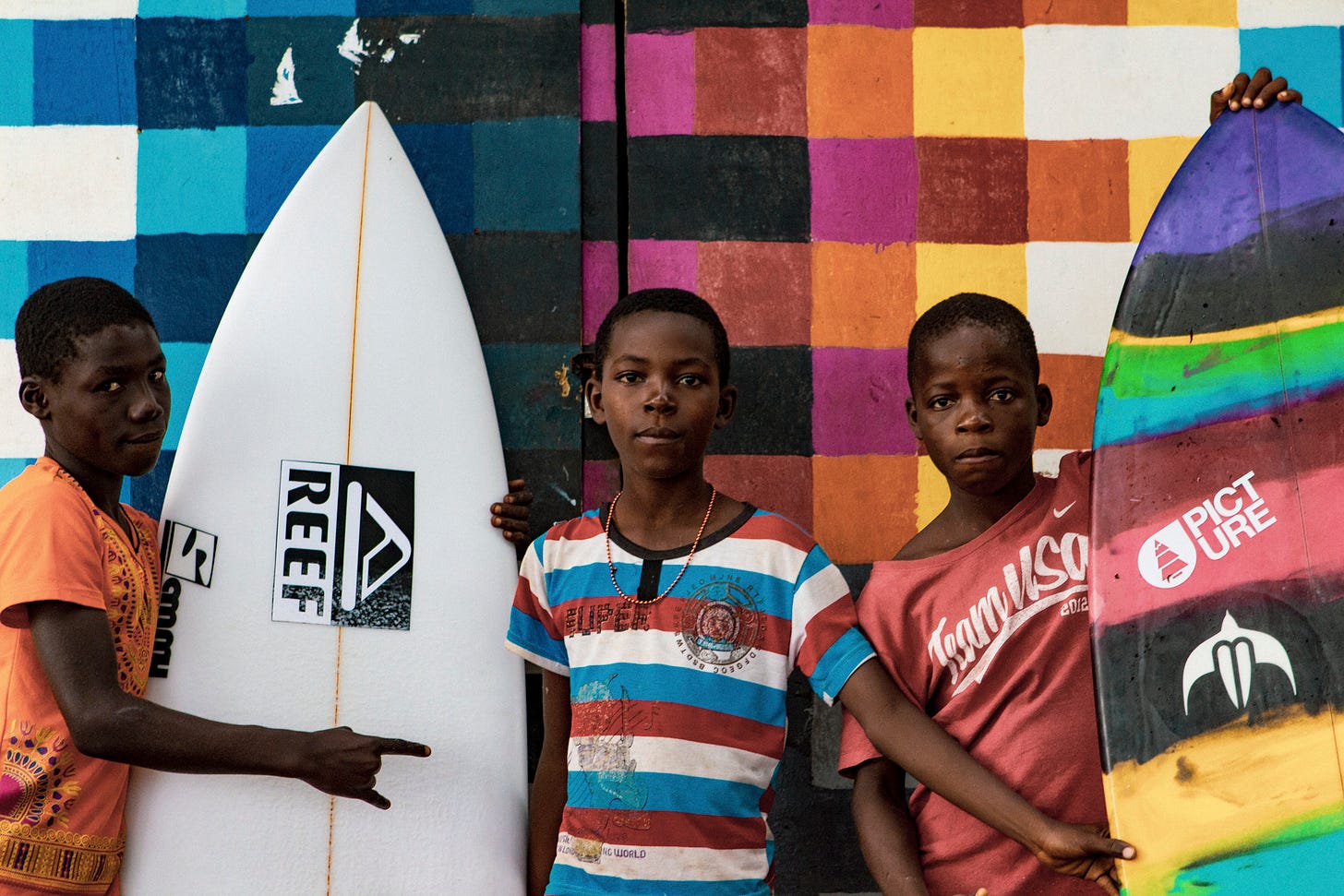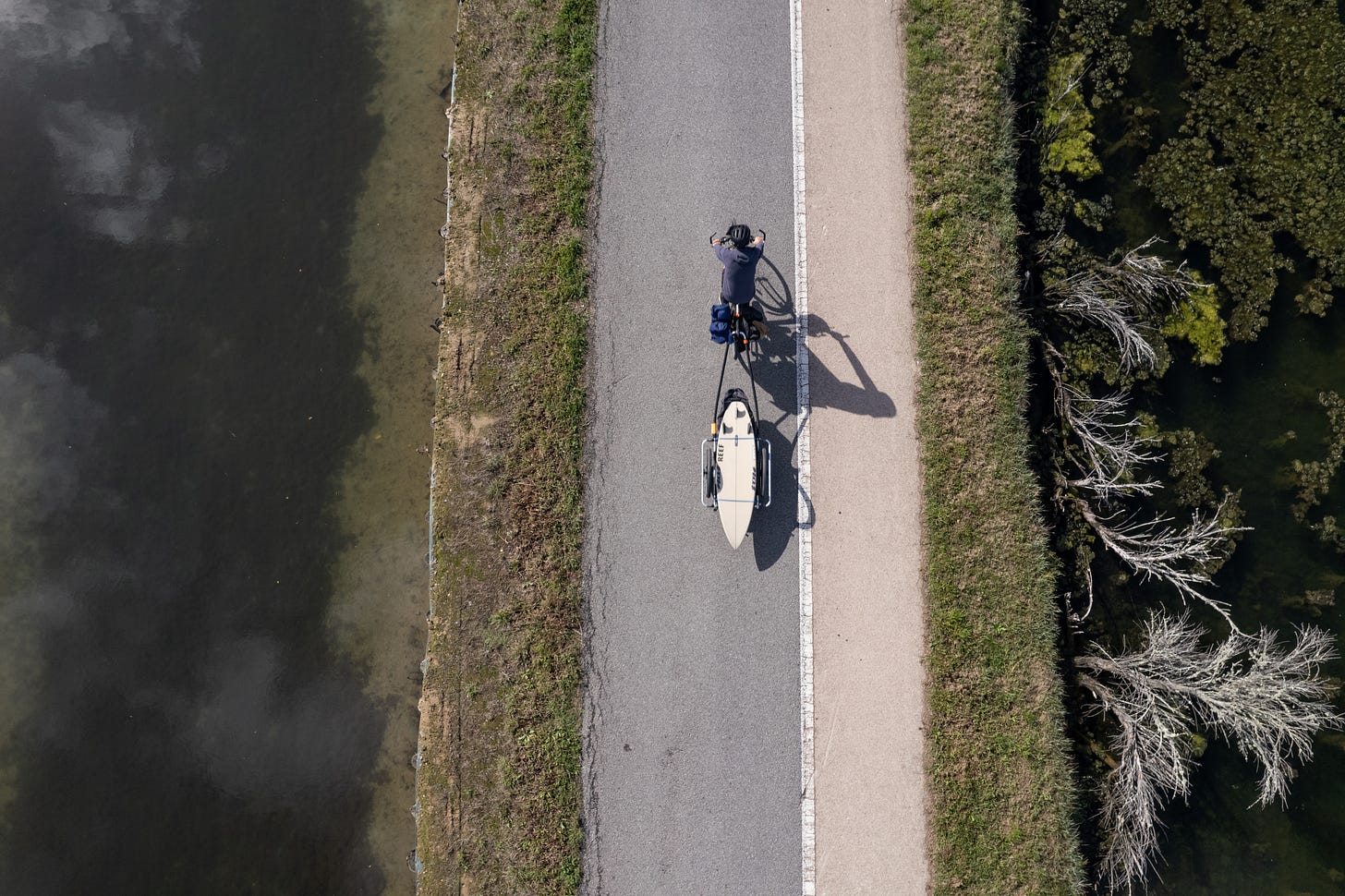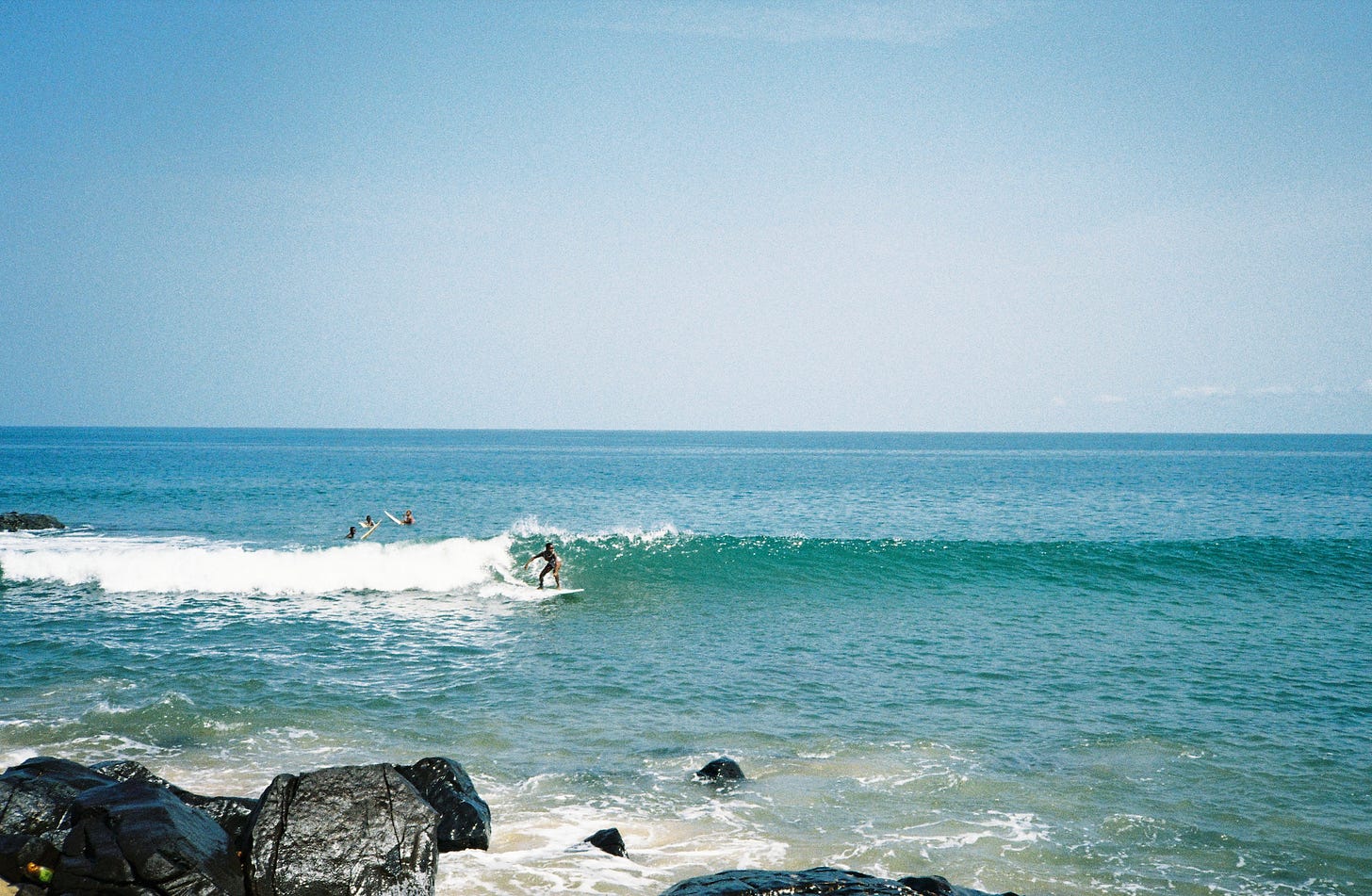“The surf community can have a really positive impact.”
An interview with surfer, filmmaker, and environmental advocate Arthur Bourbon, who lives in SW France
“The [surf club in Liberia] is proof that when people work together, the surf community can have a really positive impact on places – it’s a success story that needs to be told. We always talk about the dramas and sad stories, but all the happy and successful stories need to be told as well.”
I first met Arthur at Patagonia’s Surf Impact camp in Seignosse last spring, where he gave a great presentation of the development threats facing a magical wave and marine ecosystem in Barbuda. Arthur himself grew up in nearby Guadeloupe, though he now lives in SW France, where he surfs to a very high standard as you can see from some of the pictures accompanying this piece.
In this conversation we talk about that wave in Barbuda, the surf club he’s been supporting in Liberia, the joys of a cycle-surf road trip, and the impact of hosting the surfing stage of the Olympics in Tahiti. I hope you enjoy our chat.
Hey Arthur, have you just been for a surf? How was it?
It was good to be in the water on a Monday morning. We’ve had some big storms the last two weeks but otherwise it’s been pretty fun this fall.
Until three weeks ago, it was really warm. We were surfing with spring suits in crazy warm weather, then we used 3/2s for one or two sessions, then almost overnight went to 4/3s as it got stormy and colder.
When we met last year, you told me about a wave that was under threat from a development in Barbuda…
Yes, I was born and raised in the Caribbean, in Guadeloupe, which is an island really close to Barbuda. On Barbuda there is this famous wave, that everyone knows, it’s been used in lots of surf ads, but no one knows exactly where it is. There have been plans to build a big development there, with a resort and golf course and that kind of stuff.
The whole project is really wrong, it’s called ‘peace, love, and happiness’ but the environmental impact assessment is full of bullshit. No one knows exactly how much the development will destroy the wave but it’s touching all the dunes and ecosystem, and from satellite images you can see the development has already affected the headland.
If the wave disappears, I’ll be sad because I have crazy good memories of surfing there and it’s a beautiful wave, but it only works maybe 20 times a year, and there is no local surf community there. It’s not like in the UK or France, where if you destroy an entire beach, 100s or 1000s of people will be affected. But the wave has been a good way to highlight the damage being done to this place, which is a protected wetland surrounded by a marine reserve with mangroves and lagoon. These protected spaces are just labels; they don’t have any power or enforcement to protect them.
When you made the film Water Get No Enemy in 2020 about child soldiers turned surfers in Liberia, you were also using surfing to tell a bigger story. How do you feel about that project looking back?
I’m super proud. To do a project like that and have it spark and create its own momentum that makes real change, is the biggest achievement you can have as a filmmaker. They now have a nice surf club that’s been built and open since the summer of 2022. They have scholarships for kids to go to school or older kids to go to the capital city for say hospitality training or business management, to have skills to develop projects in the village around the surf club and bring an income to the community, creating jobs through tourism.
We released a short film about the project, while we were in post-production for the documentary, which got a lot of views and was a staff pick on Vimeo. A bunch of Swiss surfers saw the short film and a couple of months later they went to Liberia, as they thought: “Oh they have crazy good waves and there is no one out there.” They were already linked to Africa, through a charity called Velafrica, which donates bikes to the continent.
We’d been thinking we wanted our film to have an impact and get some boards out to the community, as they only had 10 or so, which were in really bad shape, and then the Swiss guys started a NGO called Provide the Slide to send boards (stacked on top of the bikes in the bike containers). They did it really well and with crazy efficiency, so we said let’s help rebuild the surf club instead. We got crowdfunding and help from other NGOs and the surf community and it went really well.
Before it was mostly teenage boys and adult males surfing – when there was one board there was always a big guy taking it from the kids – but now there are lots of girls and kids surfing. And the surf club has a surf therapy programme from a South African NGO bringing all the kids together on the beach and making it a safe space to express feelings and stuff.
I went back there in May, and I’m doing a follow up story to try and tell the story of the surf club now and what it brings to the place. It’s proof that when people work together, the surf community can have a really positive impact on places like that – it’s a success story that needs to be told. We always talk about the dramas and sad stories, but all the happy and successful stories need to be told as well.
It's not a perfect situation, people are still struggling, and the surf club cannot provide jobs for all the surfers of course. It’s one of the poorest countries in the world and there is still a lot of abuse for girls. There is a lot of female genital mutilation, which is crazy, something like 30% of the girls there go through that.
And most of the older surfers are children of the war, some are former child soldiers and some of them are refugees, who were living in the jungle for a decade trying to avoid being killed. They’ve all had a really tough childhood.
You also made Le Chemin, a cycle-surf odyssey where you rode from the Basque Country to Brittany…
I thought it would be cool to take a surf-bike trip and meet some interesting people along the way, who were all trying to do things differently. One was a permaculture farmer feeding 60 people, another was using hemp on an industrial scale but with really ethical values.
I’m really struggling with the impact of air travel. I’ve been travelling all my life and all my dreams and projects, from Liberia to Barbuda involve a plane trip. But this film was a good way to take a trip close to home and it was one of the best trips ever. Not in terms of the best waves I surfed, though I was really lucky, but just the vibe and the fact that you’re not chasing waves.
It made the trip much better and less frustrating than when you go to Indonesia and you’re there to surf and if you don’t get the biggest barrel, you’re like: “I travelled for 20 hours and it’s not that good…”. On this trip, I rode my bike and if it was good, I stopped and if it sucked, I didn’t mind.
That said, I had been planning a trip to Tahiti for 10 years, which I did this summer. I felt like if I was going to go, I wanted to spend some good time there, so I spent three months in Teahupo’o.
There’s been lots of controversy over the Olympics, as the surfing part of the Paris games is being hosted there, and there are concerns about its environmental impact, especially regarding the judging tower and damage to the reef…
Yes, I could see some of the construction. But I’m hopeful the tower development is going to stop though. It’s getting crazy attention in the press in France and worldwide. It’s one of the main topics about the Olympics. And it’s a bad look when they already have one tower for the World Surfing League, which they’ve been using for years, and it works well.
Do you feel like surfers generally care more about the environment and social justice than they did say 10 years ago?
Yes. I have been pretty surprised about how much people, and especially surfers, who don’t usually give a shit, or get moved enough by anything to take a position, are getting involved in [these causes] in a positive way. It’s nice to see that.
Even myself, I feel more concerned and engaged than I was 10 years ago. People are starting to feel the emergency of the situation and the need to protect ecosystems and natural places. To realise that cutting a tree down means something, destroying a sand dune means something. Hopefully everyone is going to do the right thing in time.
Follow Arthur on Instagram here.
Watch the trailer for Water Get No Enemy here (includes links to the main film).
Watch the trailer to Le Chemin here (also includes links to the main film).
Both films are awesome, I watched them both again this week, so I definitely encourage you to check them out.
Other news:
I loved this short film about Lois Pendlebury, the skateboarding turned shepherdess by Percy Dean. Lois was on the cover of Cooler Magazine way back when, and whenever I met or interviewed her, I always found her to be very thoughtful and perceptive, which is exactly how she comes across in the film. I should have an interview with Lois coming up in the NY.
In less uplifting news, the whole demonising of climate protesters by the UK government and establishment media over the last year or two has been totally depressing and bizarre (see also the Labour party avoiding the words green and climate).
But it makes a lot more sense after reading this thread, which George Monbiot linked to in a piece on Why billionaires are blocking climate action, which explains how oil and gas giants including Exxon Mobil have been funding a think tank called the Policy Exchange which pretty much wrote the laws on policing & sentencing protesters. Like COP28 being held in Dubai, you couldn’t make it up.
And finally, I’ve been doing this newsletter for over a year now and I’m really stoked with the support from you all – it’s a true joy to write for such an engaged and passionate audience and I love the comments and personal messages that people send me.
I have no plans to make the newsletter anything other than free in the future, but I am going to open it up to paid subscribers (at the lowest possible tier of £3.50 a month), just so that those who can afford to support my work are able to do so. Please don’t worry if you can’t though!
As ever, please fwd this newsletter to anyone who you think might be interested & if you have any story tips on any of these themes pls get in touch.








